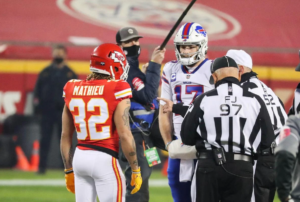Both Teams Deserve a Chance in Overtime

by Matt Rosenthal ‘22
 The NFL playoffs are more exciting than ever. The expansion to 7 teams per conference has meant more opportunities for exciting football for fans. Each of the six Divisional and Conference Championship games were decided by one score and came down to the wire. However, there is one fatal flaw to the exciting matchups: overtime.
The NFL playoffs are more exciting than ever. The expansion to 7 teams per conference has meant more opportunities for exciting football for fans. Each of the six Divisional and Conference Championship games were decided by one score and came down to the wire. However, there is one fatal flaw to the exciting matchups: overtime.
The Kansas City Chiefs and the Buffalo Bills had a duel for the ages in the Divisional Round. The teams combined for 25 points in the last two minutes of regulation. The game was tied and was thus sent into overtime. Kansas City won the coin toss and it was game over. Fans and Bills players alike knew that the powerful offense of the Chiefs would drive down the field and score. Bills QB Josh Allen was never given a chance to fight back.
It was deja vu the following week in the AFC Championship when the Chiefs kicked a tying field goal as regulation expired. Kansas City won the toss and fans had the same feeling: it was over and the Chiefs would win. However, Patrick Mahomes threw an interception, which set up the game winning field goal for the Cincinnati Bengals and they reached their first Super Bowl in over 30 years.
Regardless of these two different results, the NFL’s overtime has to be changed. It is unfair to teams, as more often than not the team who wins the coin toss, usually wins the game. In this regard, it was a fluke that Mahomes threw a pick in overtime against the Bengals. Since the adoption of the new playoff overtime rules in 2010, the team who wins the toss is 10-2, with 7 of the wins coming on the first drive. More than half the time, one of the teams in overtime never even gets an offensive possession.
The current playoff overtime rules are as follows: 15-minute period until a winner is decided; if the score remains tied after each team’s first possession, the next score wins; 3 timeouts per 2 overtime periods; no coaches challenges. Those rules are fine, but there is one key issue: the team who does not win the toss is not guaranteed a drive. If the team who has possession first scores a touchdown, then the game is over. If they score a field goal or don’t score, the opponent has a chance to either tie or win on their offensive possession.
The NFL’s extra period can be fixed with one definite change that each team is guaranteed a drive, which will ensure that each team has a fair chance of winning the game, especially in the playoffs. Another change that should be considered by the NFL is to adopt a similar rule to college football if a game lasts more than one overtime. What the NCAA has incorporated is alternating two-point conversions if a game remains tied after two extra frames. The NFL should keep its 15-minute overtime in place, but if it remains tied, then teams would go back and forth with two-point conversions until a winner emerges.
Football has never been more exhilarating, but thrilling games have been tarnished due to the NFL’s horrible overtime rules. If the Super Bowl, for example, goes into overtime, there is overwhelming evidence to support that the team who wins the coin toss will win the game. A game should come down to who played better football and/or who put more points on the board, not a coin flip.